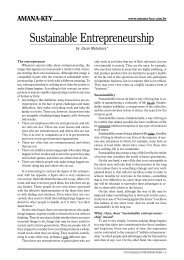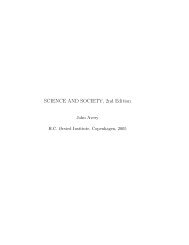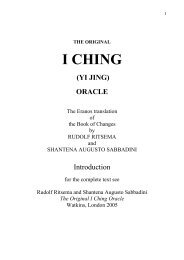Chaordic Organizations - The Pari Center for New Learning
Chaordic Organizations - The Pari Center for New Learning
Chaordic Organizations - The Pari Center for New Learning
You also want an ePaper? Increase the reach of your titles
YUMPU automatically turns print PDFs into web optimized ePapers that Google loves.
www.amana-key.com.br<br />
<strong>Chaordic</strong> organizations have great potential <strong>for</strong> enabling<br />
human creativity to go beyond its current limits. In fact, if<br />
we don’t contaminate chaordic principles with the fears<br />
inherent in management processes based on control, there<br />
will be no limit to what human beings can create.<br />
4. Essential values, today<br />
Autonomy, freedom, respect – values that people more<br />
and more genuinely value – real freedom, real human respect<br />
are much more in line with chaordic principles than<br />
with the more traditional <strong>for</strong>ms of organizational structure.<br />
In traditional organizations, these values are always<br />
“under pressure,” given little quarter, limited. This occurs<br />
naturally, on the one hand, given that control is, by<br />
definition, the limitation of the space <strong>for</strong> free action. On<br />
the other hand, such values are also limited through abuse<br />
of power, creating “underworlds” in the organization, organizational<br />
politics, unethical agreements, the absence<br />
of transparency, etc.<br />
5. <strong>The</strong> Age of Knowledge<br />
In an age in which all human knowledge will be available<br />
to whomever needs it, it is fundamental that space <strong>for</strong><br />
people be available, that it exist. Not to provide such a<br />
space would be an enormous waste of human potential.<br />
<strong>The</strong> principles of chaordic organizations ensure the<br />
existence of such spaces. Traditional organizational structures<br />
that fragment work in principle limit space, and thereby<br />
reduce the area available <strong>for</strong> action (on the presumption<br />
that its employees don’t have the necessary knowledge,<br />
or sufficient potential to create what is needed). <strong>The</strong><br />
assumption is that their employees are not capable of<br />
thinking, and that they are there to carry out what has<br />
been thought of by others, their “superiors.”<br />
<strong>Chaordic</strong> organizations honor people who think. In fact,<br />
they honor and respect everyone.<br />
<strong>The</strong> potential of chaordic organizations in the<br />
future<br />
Given our work with concepts of chaordic organizations<br />
in our advanced management programs, and in our<br />
work applying these ideas in both public and private organizations,<br />
we see the following challenges ahead:<br />
1. Resistance to the “radicalism” of chaords<br />
In principle, the majority of executives see in the concept<br />
of chaords an enormous amount of good sense and<br />
pragmatism. However, they are also afraid of the inherent<br />
radicalism of the idea, and try to soften the principles by<br />
introducing phrases such as “whenever possible” (instead<br />
of “always”) or “avoid when possible” (instead of “never”).<br />
A big challenge ahead will be to maintain the purity of<br />
the concept, and to be sure that the principles do not become<br />
contaminated with “cautions” typical of the “old system”<br />
based on control. To implement the concept in its<br />
entirety, without alterations or concessions, requires great<br />
courage.<br />
2. <strong>The</strong> capability <strong>for</strong> abstraction<br />
To define principles that truly represent the essence<br />
of an organization requires an exceptional refinement of<br />
the capability <strong>for</strong> abstraction. In addition, those who define<br />
principles must do so in a way that those who are to<br />
implement them (“ordinary” people, regular employees)<br />
will understand them, especially in their spirit even more<br />
than in the letter of the principles.<br />
<strong>The</strong> challenge ahead is going to be to find enough people<br />
in our organizations, as well as in society, capable of<br />
the necessary level of abstraction. Given the type of education<br />
that people in leadership positions tend to receive<br />
(little attention to philosophy, <strong>for</strong> example), the number of<br />
people capable of working with essential principles is not<br />
going to be sufficient. <strong>The</strong> challenge is going to be to trans<strong>for</strong>m<br />
minds trained to deal with procedures into minds<br />
capable of creating principles.<br />
3. Ego and reductionist purposes<br />
<strong>The</strong>re are principles, and there are principles… Some<br />
are aimed at realizing egoic and individualistic purposes,<br />
others are aimed at realizing purposes <strong>for</strong> the common<br />
good, from which everyone benefits.<br />
In a world replete with contradictions, paradoxes, and<br />
imbalances – a world today that is chaotic – the application<br />
of the concept of the chaord requires that we define what<br />
kind of order we want to create. <strong>The</strong> desired order is one<br />
that benefits all, without exception.<br />
And this defines another challenge: lasting, universal<br />
chaords require an advanced level of consciousness. In other<br />
words, a partial chaord, built on a low level of consciousness,<br />
can work, <strong>for</strong> a while. But even in the short term,<br />
anything it succeeds in doing will be shortsighted, illusory,<br />
fleeting, and ultimately will only contribute to the chaos of<br />
the whole rather than to a new and greater order.<br />
4. Universal principles<br />
Ultimately, those principles that serve as the basis<br />
<strong>for</strong> chaordic systems must be universal in character, and,<br />
as such, based on that which is truly universal.<br />
In this sense, the greatest challenge in the future will<br />
continue to be our eternal quest <strong>for</strong> greater truths, in<br />
fact, <strong>for</strong> Truth itself, those great principles that govern<br />
everything around us, the Truth that governs both the<br />
macrocosm and the microcosm. <strong>The</strong> greatest challenge<br />
is <strong>for</strong> everyone together, humanity as a whole, to seek<br />
this great Truth. Science, metaphysics, and all the paths<br />
of knowledge are united in this process.<br />
Only the capability <strong>for</strong> abstraction will enable us to<br />
translate these great principles <strong>for</strong> use in organizations,<br />
companies, nations, and all of society. It is in this coherence<br />
that the order we all seek resides.<br />
2 • CHAORDIC ORGANIZATIONS







